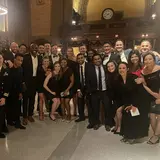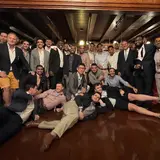
Sam Hufton ’22
MBA for Executives
Asset Management
Senior principal, Partners Capital LLP
The asset management industry has reached an inflection point. Over the past four decades, industry growth has been fueled by economic expansion, financial gearing, loose monetary policy, and technological innovation. The industry has become overcrowded, and it’s about to face a challenging period of lower growth and rising interest rates. At the same time, stakeholders beyond Wall Street are gaining traction, and businesses are required to think more seriously about considerations beyond financial returns.
I met a few industry peers in Boston who’d gone through Yale SOM’s EMBA asset management program. I came to visit New Haven out of curiosity and never looked back. The combination of an integrated core curriculum and the range of asset management courses have provided me with a set of tools, perspectives, and a network to tackle what is likely to be a difficult decade of investing.



The Future of Global Finance and Competitive Strategy have been among the most impactful courses to me. We tackled a spectrum of current topics in The Future of Global Finance, including the role of crypto/digital currencies, geopolitical tension between the U.S. and China, and climate change. It made an immediate impact on how I consider these issues and their impact on the investing landscape.
I’ve also taken excellent electives in healthcare investing, focused on startups and biotech. One of the most appealing aspects of Yale is the access to a broad set of courses across campus. Electives provide an opportunity to take a deep dive into a narrow focus. Most recently I took Economics of High-Tech Industries, taught by Professor Ted Synder. The course featured a range of high-profile guest speakers, including CEOs of global businesses and managing partners of venture capital firms.



At Yale SOM, I’ve also developed my “human skills,” which were invaluable managing a team through the work-from-home transition during the pandemic. Operating in this uncertain environment highlighted the importance of clear communication and structure to remain effective, but it also underscored the need for flexibility and greater consideration of personal circumstances.
Our leadership development course helps us develop our full potential as managers and leaders. It’s a no-holds-barred exercise in introspection. My main takeaway is there are many different styles of leadership, and each comes with its own strengths and weaknesses. The key is recognizing what adjustments can be made to your own style to make you more effective.



